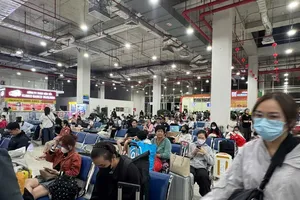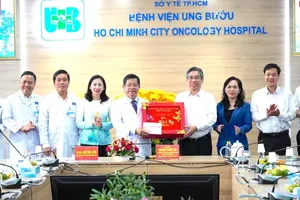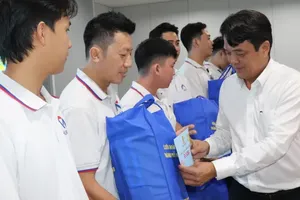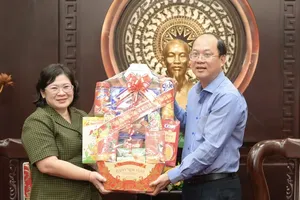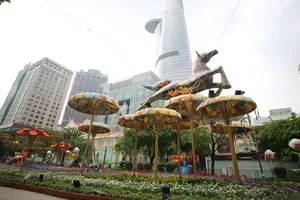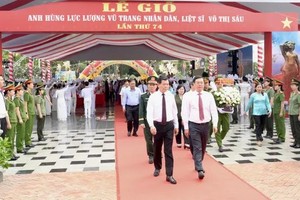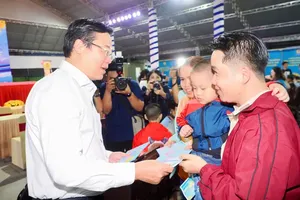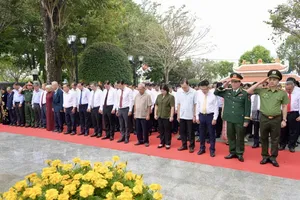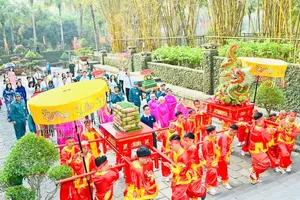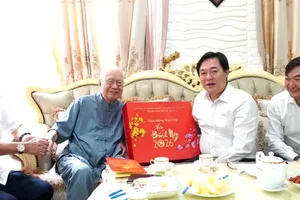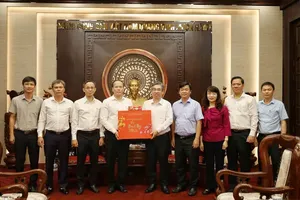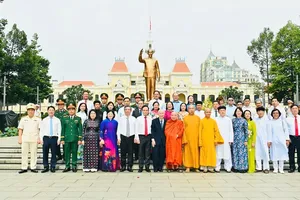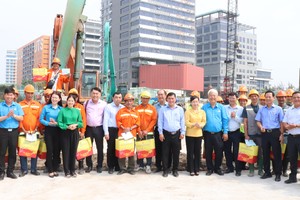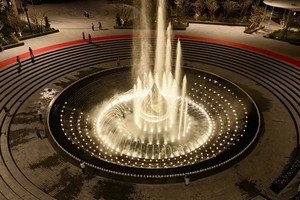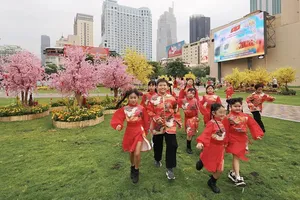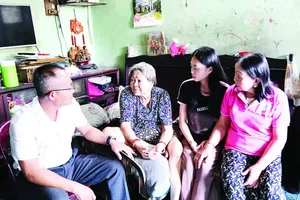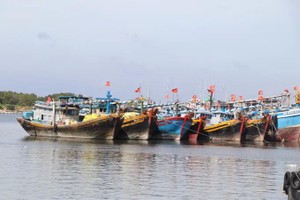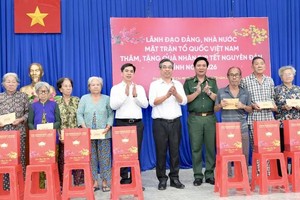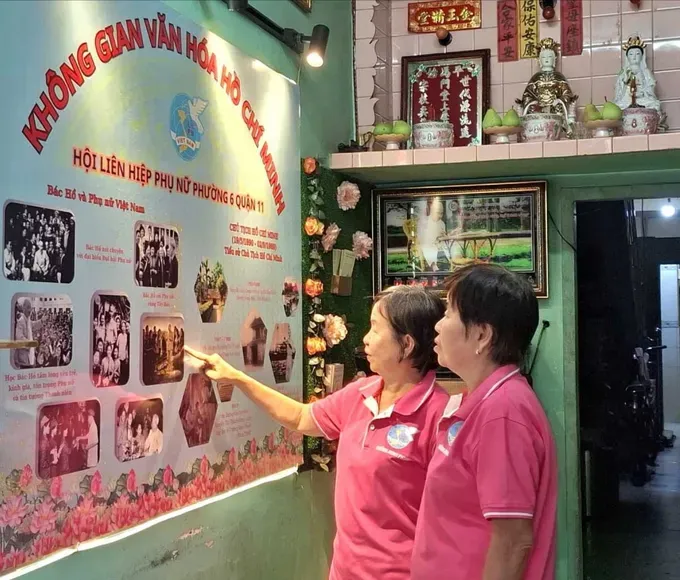
Allure of online ritual
Buddhism and many other religions aren’t just standing on the sidelines of HCMC’s and the nation’s digital transformation. They’re proactively immersing themselves in new technology. Pagodas, once familiar only with incense smoke and bell chimes, are now popping up on YouTube, Facebook, and TikTok as familiar “digital spaces,” where rituals, sermons, and community messages are now disseminated rapidly.
Technology is reshaping faith-based life. During the 2025 Vu Lan season, major pagodas like Vinh Nghiem (HCMC) and Ba Vang (Quang Ninh Province) livestreamed ceremonies for the first time, attracting hundreds of thousands of viewers. Buddhists far from home, needing only a smartphone, could now join the chanting, pin a virtual rose, or register for online memorial prayers. Rituals once bound to physical temples are now fully present in the digital world, expanding community borders.
Socio-economic activities tied to religion are also being digitized. Monks reportedly host livestreams selling products like candles and herbal items to raise funds for temple upkeep and charity.
For example, Venerable Thich Dam Ngoan sells an OCOP-certified shampoo, with all profits supporting his orphanage. On TikTok, “thichkhaiquang” (nearly 700,000 followers) sells statues and dried goods, interspersing stories. This earthy, simple approach resonates, turning each purchase into a small act of support.
Religious institutions are also building digital libraries. In Minh Phung Ward (HCMC), Phung Kim Phung, an ethnic Chinese Buddhist, runs a “mini digital library” from her home. She translates Party/State policies into Chinese, shares them via Zalo, and personally teaches non-tech-savvy neighbors how to scan QR codes and read the documents.
Nearby in Cho Lon Ward, Buu Son Pagoda established a larger-scale digital library. It features more than 200 titles (scriptures, law) translated into Vietnamese, Chinese, and English, all accessible via QR code. Critically, the library also regularly updates links that identify misinformation and distorted claims about religious policies, helping followers raise their vigilance and secure their faith.
It’s safe to say that as urban life charges into the modern era, religion – long associated with faith and tranquility – has been remarkably nimble, choosing its own way to transform. These steps aren’t just about preserving tradition; they’re about opening an entirely new channel, connecting faith with the community, the sacred with the secular, and the past with the future.
Keeping pace with digital reform
It’s almost noon, and the hall of the An Dong Ward Public Administration Service Center is still buzzing with people. Amidst the busy atmosphere, a volunteer guides Tran Cam Tuong (born 1961), an ethnic Chinese resident, to the reception desk of Chau Tran Chi Hao, the official in charge of construction permits.
“Please sit here, uncle, let me help you,” Hao says, taking the stack of papers. He then switches seamlessly to Cantonese: “First, let me just confirm a few things...” Mr. Tuong nods, and the stress-lines on his forehead visibly ease.
Chi Hao, as an ethnic Chinese public servant in HCMC, uses Cantonese daily. For nearly 20 years, this language advantage has been his “key” in a district with a high ethnic Chinese population. He shared that many residents aren’t fluent in Vietnamese and get even more flustered submitting applications online. “My first job is to help them feel at ease,” he said, before he patiently explains the process step-by-step, even learning technical terms in Chinese just so he can guide residents with perfect accuracy.
The service center’s Deputy Director Vo Thanh Toi noted that after the July 1, 2025 merger, the volume of applications skyrocketed to 170-200 visits a day. The most common requests? Certified copies, civil status (birth/death/marriage) records, and social support policies. Certified copies alone account for about 8,000 visits, resulting in over 20,000 issued documents.
An Dong Ward is unique, he explains, as 27 percent of its residents are ethnic Chinese. Because of this, the center doesn’t just post staff and volunteers to provide hands-on support; they’ve also compiled bilingual Vietnamese-Chinese flyers, laminated them, and placed them at every counter. QR-code-enabled handbooks detailing the most common procedures are also being sent out to every neighborhood. “The goal,” he says, “is for every family to have at least one person who knows the process.”
The ward isn’t just relying on paper, either. It’s pushing information out on its fanpage and through Zalo groups, making sure the message reaches every household. When people come to the center, they don’t have to “swim” through the procedures alone; there’s always someone there to guide them.
Results of implementing ethnic, religious policies in HCMC
According to the HCMC Department of Ethnic and Religious Affairs, the city is a “special municipality” with no designated ethnic minority regions or “extremely difficult” communes. Because of this, HCMC has always focused on adapting central-level policies to issue its own specific mechanisms to support its ethnic minority communities.
Sustainable poverty reduction has been effectively implemented through job placements, livelihood support, health insurance cards, and financial aid, helping many households escape poverty. Policies for education, vocational training, and student loans have been maintained, with more families prioritizing investment in their children’s education.
The city has also prioritized the preservation and promotion of cultural and linguistic values. Decision No. 3016/QD-UBND in 2023, which approved teaching and learning materials for the Chinese, Khmer, and Cham languages, has been rolled out. Traditional festivals, like Nguyen Tieu of the Chinese and the Ghe Ngo (boat race) of the Khmer, are held annually, helping to preserve their unique identities.
A network of 1,200 prestigious people in ethnic communities acts as a “bridge.” An accommodation movement completed 733 houses (100 percent target). Religious holidays are organized solemnly. Notably, HCMC’s UN Day of Vesak 2025, with more than 1,300 international delegates, clearly affirmed the policy of religious freedom. These results strengthen unity and reinforce faith in the Party and State.
